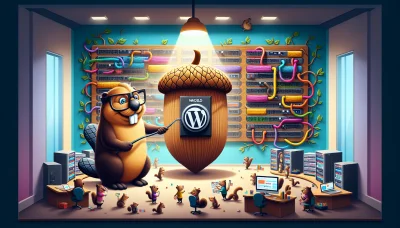How to make a website without a website builder Quiz
Test Your Knowledge
Question of
How to Make a Website Without a Website Builder
This article will guide you through the steps of creating a website from scratch without relying on a website builder. We will cover everything from the basics of web development, including HTML, CSS, and JavaScript, to more advanced topics such as responsive design and SEO strategies. Additionally, a significant focus will be on understanding web hosting - a crucial component for anyone looking to publish their site online. By the end of this guide, you'll have a solid foundation to start building your own website with confidence.
Understanding Web Hosting
Web hosting is a service that allows individuals and organizations to post a website or web page onto the Internet. A web host, or web hosting service provider, is a business that provides the technologies and services needed for the website or webpage to be viewed in the Internet. Websites are hosted, or stored, on special computers called servers. When Internet users want to view your website, all they need to do is type your website address or domain into their browser. Their computer will then connect to your server and your webpages will be delivered to them through the browser.
Web hosting is crucial for anyone looking to create a website without using a website builder because it offers the infrastructure and resources necessary for your website to be accessible on the Internet. This includes not just the space to store your website’s files, but also the technology to deliver your website’s content to visitors from around the world. Without web hosting, your site cannot be accessed by others online, making it an essential component of launching and maintaining a website.
Types of Web Hosting
- Shared Hosting
- VPS Hosting
- Dedicated Hosting
- Cloud Hosting
Choosing a Web Hosting Provider
When selecting a web hosting provider, it's crucial to consider several key factors to ensure that your website runs smoothly, remains accessible, and can grow with your needs. First and foremost, reliability is paramount; look for providers that offer high uptime guarantees, typically upwards of 99.9%, to ensure your site is always available to your visitors. Cost is another essential factor, but it's important to balance affordability with the features and support you need. Don't just opt for the cheapest provider; consider the value you're getting for your money. Customer service is also crucial; your hosting provider should offer responsive, knowledgeable support to assist you with any issues that arise. Finally, consider scalability ; your provider should offer options to easily upgrade your resources as your site grows. By carefully evaluating these factors, you can choose a web hosting provider that meets your current needs and can accommodate your future growth.
Setting Up Your Website
After selecting a web hosting provider, the next steps to set up your website involve a few crucial actions. First, you need to purchase a domain name. This will be your website's address on the internet, so choose something memorable and relevant to your content or business. Next, setting up email accounts associated with your domain name adds a professional touch to your communication. Most hosting providers offer tools to easily create and manage email accounts. Finally, installing a Content Management System (CMS) like WordPress, Joomla, or Drupal can simplify the process of designing, managing, and updating your website. A CMS allows you to create and organize your content with little to no coding knowledge. By following these steps, you'll have a solid foundation for your online presence.
Building Your Website
| Method | Pros | Cons | Best For |
|---|---|---|---|
| Coding from Scratch |
|
|
Complex websites with specific requirements |
| Using a CMS like WordPress |
|
|
Bloggers, small to medium businesses |
| Hiring a Web Developer |
|
|
Businesses requiring professional and customized websites |
Maintaining Your Website
Maintaining your website is crucial for ensuring its long-term success and reliability. Regular website maintenance includes updating content to keep your audience engaged and informed. This not only helps in retaining your current visitors but also in attracting new ones. Additionally, monitoring website performance is essential for providing a smooth user experience. Identifying and fixing any issues such as slow loading times or broken links can significantly improve the overall functionality of your site. Ensuring website security is another critical aspect of maintenance. Protecting your site from potential threats and vulnerabilities keeps both your data and your users' information safe. By prioritizing these maintenance tasks, you can enhance your website's performance, security, and user engagement.












